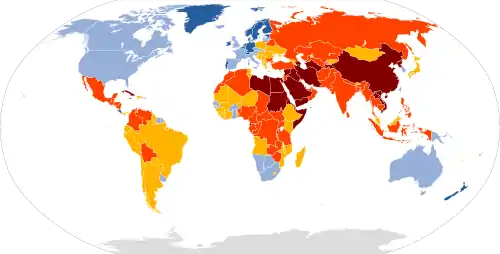World Press Freedom Day
The United Nations General Assembly declared May 3 to be World Press Freedom Day[1][2] or just World Press Day, observed to raise awareness of the importance of freedom of the press and remind governments of their duty to respect and uphold the right to freedom of expression enshrined under Article 19 of the 1948 Universal Declaration of Human Rights and marking the anniversary of the Windhoek Declaration, a statement of free press principles put together by African newspaper journalists in Windhoek in 1991.
| World Press Freedom Day | |
|---|---|
 World Press Freedom Day 2017 poster | |
| Date | May 3 |
| Next time | 3 May 2021 |
| Frequency | Annual |
History

In 2018, a conference sponsored by the United Nations Alliance of Civilizations was canceled.[4][5] In 2018, several news organizations joined together for an ad campaign.[6] Slain journalists in Kabul were remembered.[7]
Prizes
UNESCO marks World Press Freedom Day by conferring the UNESCO/Guillermo Cano World Press Freedom Prize on a deserving individual, organisation or institution that has made an outstanding contribution to the defence and/or promotion of press freedom anywhere in the world, especially when this has been achieved in the face of danger. Created in 1997, the prize is awarded on the recommendation of an independent jury of 14 news professionals. Names are submitted by regional and international non-governmental organisations working for press freedom, and by UNESCO member states.[8]
The Prize is named in honour of Guillermo Cano Isaza, a Colombian journalist who was assassinated in front of the offices of his newspaper, El Espectador, in Bogotá, on 17 December 1986. Cano's writings had offended Colombia's powerful drug barons.
UNESCO conference
UNESCO also marks World Press Freedom Day each year by bringing together media professionals, press freedom organisations and UN agencies to assess the state of press freedom worldwide and discuss solutions for addressing challenges. Each conference is centred on a theme related to press freedom, including good governance, media coverage of terrorism, impunity and the role of media in post-conflict countries.
List
Source:[9]
| Year | City | Theme |
|---|---|---|
| 1998 | England London | "Press Freedom is a Cornerstone of Human Rights." |
| 1999 | Colombia Bogotá | "Turbulent Eras: Generational Perspectives on Freedom of the Press." |
| 2000 | Switzerland Genève | "Reporting the News in a Dangerous World: The Role of the Media in conflict settlement, Reconciliation and peace-building." |
| 2001 | Namibia Windhoek | "Combating racism and promoting diversity: the role of free press." Held jointly with the commemoration of the 10th Anniversary of the Windhoek Declaration. The occasion was marked by the signing of the African Charter on Broadcasting. |
| 2002 | Philippines Manila | "Covering the War on Global Terrorism." |
| 2003 | Jamaica Kingston | "The Media and Armed Conflict." |
| 2004 | Serbia Belgrade | "Who decides how much information?". |
| 2005 | Senegal Dakar | "Media and Good Governance". |
| 2006 | Sri Lanka Colombo | "The media as drivers of change." |
| 2007 | Colombia Medellín | "The United Nations and the freedom of press." |
| 2008 | Mozambique Maputo | "Celebrating the fundamental principles of press freedom." |
| 2009 | Qatar Doha | "Dialogue, mutual understanding and reconciliation." |
| 2010 | Australia Brisbane | "Freedom of information: the right to know". |
| 2011 | United States Washington, D.C. | "21st Century Media: New Frontiers, New Barriers". |
| 2012 | Tunisia Tunis | "New Voices: Media Freedom Helping to Transform Societies" |
| 2013 | Costa Rica San José | "Safe to Speak: Securing Freedom of Expression in All Media". |
| 2014 | France Paris | "Media Freedom for a Better Future: Shaping the post-2015 Development Agenda". |
| 2015 | Latvia Riga | "Let Journalism Thrive! Towards Better Reporting, Gender Equality, & Media Safety in the Digital Age". |
| 2016 | Finland Helsinki | "Access to Information and Fundamental Freedoms". |
| 2017 | Indonesia Jakarta | "Critical Minds for Critical Times: Media’s role in advancing peaceful, just and inclusive societies". |
| 2018 | Ghana Accra | "Keeping Power in Check: Media, Justice and the Rule of Law".[10] |
| 2019 | Ethiopia Addis Ababa | "Media for Democracy: Journalism and Elections In Times of Disinformation”.[11] |
| 2020 | The Hague, Netherlands | "Journalism without Fear or Favour”.[12] |
See also
- Article 19, an international organisation
- Media transparency
- Reporters Without Borders
- World Association of Newspapers and News Publishers
References
- United Nations General Assembly Session 48 Verbatim Report 85. A/48/PV.85 page 29. Retrieved 2008-07-15.
- United Nations General Assembly Session 48 Document 624. Report of the Economic and Social Council – Draft Decision II A/48/624 page 22. 17 December 1993. Retrieved 2008-07-15.
- "2020 World Press Freedom Index". Reporters Without Borders. 2020.
- "NLP declines to accept terms for participation in U.N. agency event for World Press Freedom Day | The News Literacy Project". www.thenewsliteracyproject.org. Retrieved 2018-05-11.
- "Charges of Censorship as U.N. Press Freedom Day Event Is Called Off". The New York Times. 2018-05-03. ISSN 0362-4331. Retrieved 2018-05-11.
- Stelter, Brian. "'Read more, listen more:' Newsrooms unite for World Press Freedom Day". CNNMoney. Retrieved 2018-05-11.
- "Slain Afghan journalists remembered on World Press Freedom Day". Arab News. 2018-05-03. Retrieved 2018-05-11.
- "UNESCO is seeking nominations for UNESCO/Guillermo Cano World Press Freedom Prize 2018 – DEADLINE 15 February". UNESCO. Retrieved 2018-05-11.
- "Previous celebrations – United Nations Educational, Scientific and Cultural Organization". www.unesco.org.
- https://en.unesco.org/wpfd
- https://en.unesco.org/wpfd
- https://www.un.org/en/observances/press-freedom-day
External links
| Wikisource has original text related to this article: |